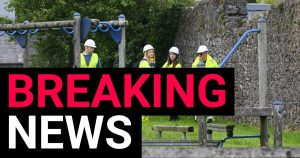Paragraph 1: The Rising Cost of Homeownership
Homeowners in the UK are facing a significant increase in mortgage costs, with the Conservative Party attributing this rise to a "Labour mortgage premium." This alleged premium, estimated at £500 per year, reflects the increased borrowing costs faced by the government. Data from Moneyfacts reveals that five-year fixed-rate mortgages, the most popular type of mortgage deal, have climbed to 5.3%, their highest level since August. This surge in mortgage rates follows recent market turmoil, prompting lenders to adjust their offerings upwards. The Conservatives argue that this increase translates to a £500 annual burden on mortgage borrowers compared to pre-October Budget levels.
Paragraph 2: Political Blame Game
The Conservative Party places the blame for the rising mortgage costs squarely on the Labour Party and their economic policies. Shadow Chancellor Mel Stride criticizes Labour’s Shadow Chancellor Rachel Reeves, accusing her of reckless budgeting that has led to this "Rachel Reeves mortgage premium." Stride argues that in just six months, Labour’s leadership, Keir Starmer and Rachel Reeves, have created an environment of higher costs, increased taxes, and a weakened economy, impacting the financial well-being of British citizens. This political posturing comes amidst a broader debate about the state of the UK economy and the effectiveness of government policies.
Paragraph 3: Labour’s Positive Economic Indicators
Despite the Conservative Party’s criticism, Labour has seen some positive economic developments. Earlier this month, inflation figures showed a better-than-expected decline, dropping 0.1% to 2.5% in December. This decrease defied market predictions and provided a boost for Rachel Reeves. Analysts attribute this positive trend to several factors, including lower hotel prices and a slower rise in airfares. This positive inflation news offers a counterpoint to the Conservative narrative of economic mismanagement by Labour.
Paragraph 4: The Government’s Response and Economic Focus
In response to the economic challenges, the government emphasizes its commitment to restoring stability and fostering economic growth. Number 10 Downing Street has stated that its focus remains on these key objectives. This statement indicates the government’s awareness of the economic concerns and its intention to address them. The government’s economic strategy will likely play a significant role in determining the future trajectory of mortgage rates and the overall financial health of the UK.
Paragraph 5: Understanding Inflation and its Impact
Inflation, the rate at which the general level of prices for goods and services rises, has a direct bearing on mortgage rates and the broader economy. When inflation is high, central banks often increase interest rates to control it, which, in turn, influences mortgage rates. Lower inflation, conversely, can create room for lower interest rates. The recent drop in inflation, while positive, does not guarantee future decreases in mortgage rates, as various factors influence their trajectory. For homeowners, understanding inflation and its impact on their finances is crucial for making informed decisions.
Paragraph 6: The Complex Interplay of Economic Factors
The current mortgage rate environment reflects a complex interplay of economic factors, including government borrowing costs, market turmoil, inflation trends, and political decisions. While the Conservatives blame Labour’s policies for the rising mortgage rates, Labour points to positive inflation figures as a sign of their effective economic management. The government’s stated focus on economic stability and growth underscores the importance of these issues in the current political and economic landscape. Homeowners will continue to be affected by these interconnected factors, making it essential to stay informed and adapt to the changing economic realities.




